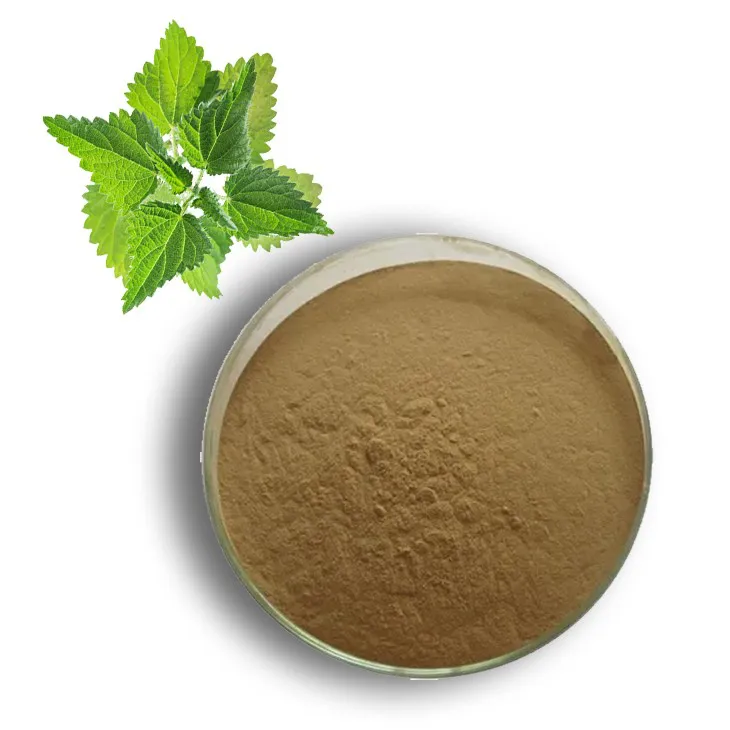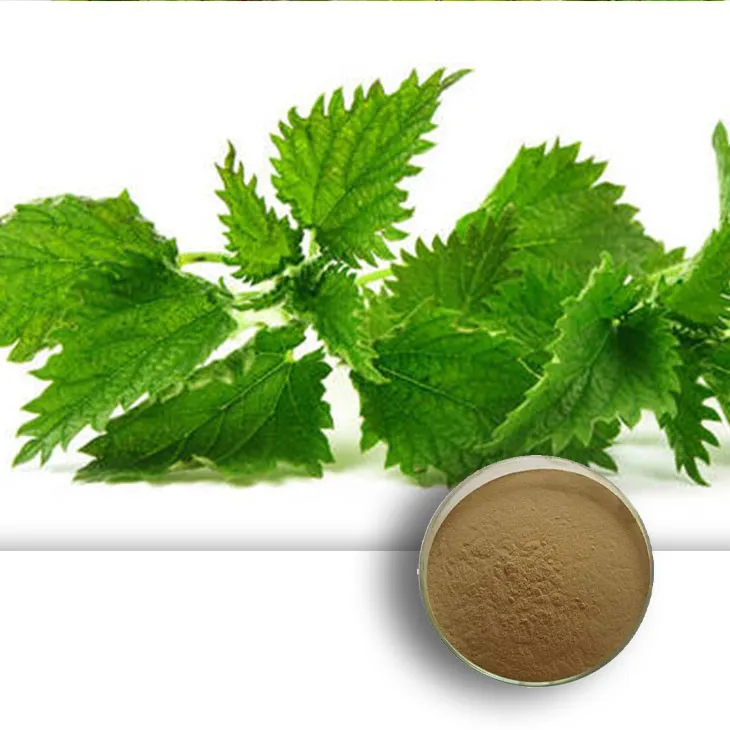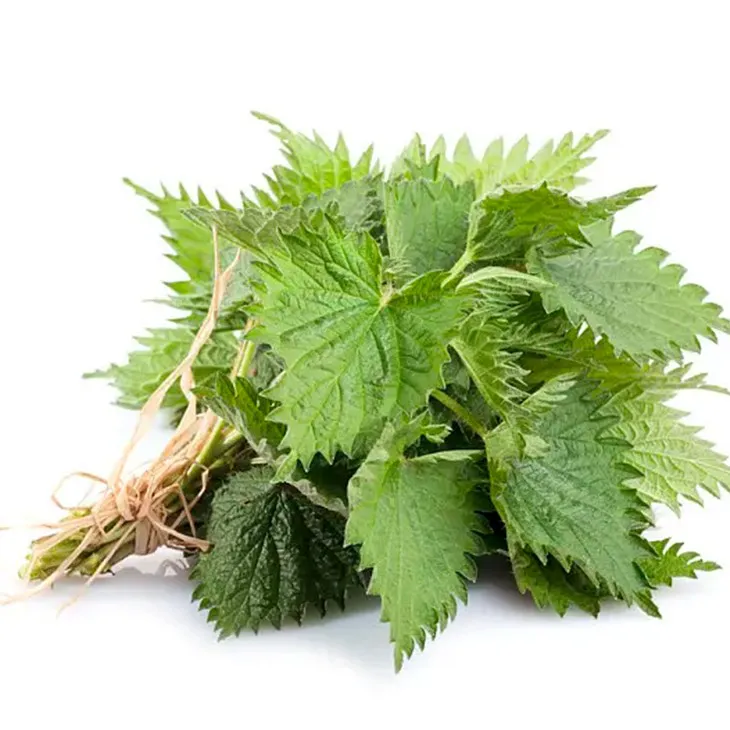- 0086-571-85302990
- sales@greenskybio.com
Best Answers to 7 Key Questions about Nettle Leaf Extract.
2025-01-01

1. What is Nettle leaf extract?
Nettle leaf extract is derived from the leaves of the stinging nettle plant (Urtica dioica). This plant has been used for centuries in traditional medicine across different cultures. The extract contains a variety of bioactive compounds, including flavonoids, phenolic acids, and polysaccharides. These components are believed to contribute to its potential health benefits.
The extraction process typically involves drying the nettle leaves and then using solvents such as ethanol or water to obtain the concentrated extract. The resulting extract can be in the form of a powder, tincture, or liquid, depending on the extraction method and intended use.

2. What are the Potential Health Benefits?
a. Anti - inflammatory Properties
One of the significant benefits of Nettle leaf extract is its anti - inflammatory effect. The flavonoids present in the extract, such as Quercetin and kaempferol, have been shown to inhibit the production of inflammatory mediators in the body. This can be helpful in conditions like arthritis, where inflammation is a major factor contributing to pain and joint damage. Studies have demonstrated that nettle leaf extract can reduce the levels of cytokines and prostaglandins, which are key players in the inflammatory process.
b. Allergy Relief
Strangely enough, nettle leaf extract can also offer relief for allergy sufferers. It may work by modulating the immune system's response to allergens. Nettle contains certain compounds that can prevent the release of histamine from mast cells, which is responsible for many of the symptoms associated with allergies, such as sneezing, itching, and a runny nose. Some people use nettle leaf extract as a natural alternative to over - the - counter anti - histamine medications.
c. Blood Sugar Regulation
There is evidence to suggest that nettle leaf extract can play a role in regulating blood sugar levels. It may improve insulin sensitivity, allowing cells to more effectively take up glucose from the bloodstream. This could be beneficial for individuals with type 2 diabetes or those at risk of developing the condition. Research has shown that the extract can influence the activity of enzymes involved in carbohydrate metabolism.
d. Prostate Health
For men, nettle leaf extract may have a positive impact on prostate health. It has been studied for its ability to relieve symptoms associated with an enlarged prostate, also known as benign prostatic hyperplasia (BPH). The extract may help to relax the smooth muscles in the prostate gland, reducing the pressure on the urethra and improving urinary flow. Some studies have indicated that long - term use of nettle leaf extract can lead to a reduction in the size of the prostate gland in men with BPH.

3. How is Nettle Leaf Extract Consumed?
Nettle leaf extract can be consumed in several ways:
- Tinctures: These are alcohol - based extracts. A few drops of nettle leaf tincture can be added to water or juice and consumed daily. The typical recommended dose for tinctures may range from 1 - 3 ml per day.
- Capsules and Tablets: Nettle leaf extract is available in supplement form as capsules or tablets. The recommended dosage usually varies between 500 - 1000 mg per day, depending on the product and the intended use. It is important to follow the instructions on the product label.
- Tea: Dried nettle leaves can be used to make tea. Steep 1 - 2 teaspoons of dried nettle leaves in hot water for about 5 - 10 minutes. Nettle tea can be consumed up to three times a day. It has a slightly earthy and grassy taste.

4. Are There Any Side Effects?
While nettle leaf extract is generally considered safe for most people when consumed in appropriate amounts, there are some potential side effects to be aware of:
- Gastrointestinal Upset: Some people may experience mild stomach discomfort, such as nausea, vomiting, or diarrhea, especially when starting to take nettle leaf extract. This is usually temporary and can often be alleviated by reducing the dose or taking the extract with food.
- Allergic Reactions: Although nettle leaf extract is sometimes used for allergy relief, in rare cases, it can itself cause an allergic reaction. People with known allergies to plants in the Urticaceae family should be especially cautious. Symptoms of an allergic reaction may include rash, itching, swelling, or difficulty breathing.
- Interaction with Medications: Nettle leaf extract may interact with certain medications. For example, it could potentially affect the way blood - thinning medications work, increasing the risk of bleeding. It is important to consult a healthcare provider if you are taking any medications before starting to use nettle leaf extract.
5. Can Nettle Leaf Extract be Used During Pregnancy?
The use of nettle leaf extract during pregnancy is a topic of debate. While some traditional medicine systems have used nettle leaves during pregnancy for various reasons, such as to support iron levels, modern medical research has not fully established its safety.
There are concerns that the bioactive compounds in nettle leaf extract could potentially affect hormonal balance or have other effects on the developing fetus. Therefore, it is generally recommended that pregnant women consult their healthcare provider before using nettle leaf extract in any form.
6. How to Store Nettle Leaf Extract?
Proper storage of nettle leaf extract is important to maintain its quality and potency. Here are some general guidelines:
- Tinctures: Store tincture bottles in a cool, dark place, away from direct sunlight. A pantry or a cupboard is usually a suitable location. The ideal temperature range for storage is between 15 - 25°C (59 - 77°F). Tinctures can typically last for 1 - 2 years if stored properly.
- Capsules and Tablets: Keep these supplements in their original packaging, in a dry and cool place. Avoid storing them in the bathroom, as the humidity can affect their quality. The expiration date on the product label should be adhered to, but generally, they can be stored for 1 - 3 years depending on the formulation.
- Tea: Dried nettle leaves for tea should be stored in an airtight container in a cool, dry place. This will prevent moisture absorption and keep the leaves fresh. Stored in this way, dried nettle leaves can last for up to a year.
7. Where can One Purchase High - Quality Nettle Leaf Extract?
There are several options for purchasing high - quality nettle leaf extract:
- Health Food Stores: These stores often carry a variety of herbal supplements, including nettle leaf extract. They may offer different forms such as tinctures, capsules, or dried leaves for tea. Staff at health food stores can sometimes provide information about the products they sell, including the source and quality of the extract.
- Online Retailers: Many online retailers specialize in selling herbal products. When purchasing from an online retailer, it is important to look for well - known and reputable brands. Read customer reviews to get an idea of the product's quality. Some popular online platforms for purchasing herbal supplements also have quality control measures in place to ensure the authenticity and purity of the products they sell.
- Direct from Manufacturers: Some manufacturers sell their products directly to consumers through their websites. Buying directly from the manufacturer can sometimes offer the advantage of getting fresher products and more detailed information about the extraction process and quality control. However, it is still important to research the manufacturer to ensure they are a reliable source.
FAQ:
Question 1: What is nettle leaf extract?
Nettle leaf extract is derived from the leaves of the nettle plant (Urtica dioica). It contains various bioactive compounds such as flavonoids, phenolic acids, and polysaccharides. These components are believed to contribute to its potential health - promoting properties.
Question 2: What are the potential health benefits of nettle leaf extract?
It may have several potential health benefits. For example, it has been associated with anti - inflammatory effects, which could potentially help in conditions like arthritis. It may also support urinary tract health, as it has diuretic properties. Additionally, some studies suggest it could play a role in blood sugar regulation and improving skin health.
Question 3: Are there any side effects of nettle leaf extract?
While nettle leaf extract is generally considered safe for most people when used appropriately, some individuals may experience side effects. These can include mild digestive issues such as stomach upset or diarrhea. Also, contact with the fresh nettle plant can cause skin irritation due to the presence of stinging hairs, but this is less of a concern with the extract.
Question 4: How is nettle leaf extract typically consumed?
It can be consumed in various forms. Nettle leaf extract is available as a dietary supplement in capsules or tablets. It can also be found in liquid form, such as tinctures. Some people also use dried nettle leaves to make herbal teas.
Question 5: Is nettle leaf extract suitable for everyone?
Not necessarily. Pregnant and breastfeeding women should avoid it as there is not enough evidence regarding its safety in these situations. People with allergies to plants in the Urticaceae family should also refrain from using it. Additionally, those on certain medications, especially blood - thinning drugs, should consult a healthcare provider before using nettle leaf extract as it may interact with the medications.
Related literature
- The Health Benefits of Nettle Leaf Extract: A Comprehensive Review"
- "Nettle Leaf Extract: Composition, Properties, and Applications"
- "Safety and Efficacy of Nettle Leaf Extract in Human Health"
- ▶ Hesperidin
- ▶ citrus bioflavonoids
- ▶ plant extract
- ▶ lycopene
- ▶ Diosmin
- ▶ Grape seed extract
- ▶ Sea buckthorn Juice Powder
- ▶ Beetroot powder
- ▶ Hops Extract
- ▶ Artichoke Extract
- ▶ Reishi mushroom extract
- ▶ Astaxanthin
- ▶ Green Tea Extract
- ▶ Curcumin Extract
- ▶ Horse Chestnut Extract
- ▶ Other Problems
- ▶ Boswellia Serrata Extract
- ▶ Resveratrol Extract
- ▶ Marigold Extract
- ▶ Grape Leaf Extract
- ▶ blog3
- ▶ blog4
- ▶ blog5
-
Nettle Root Extract
2025-01-01
-
Phellodendron Extract
2025-01-01
-
Camu Camu Extract
2025-01-01
-
Marigold Extract
2025-01-01
-
Alfalfa Meal
2025-01-01
-
Tormentil Extract
2025-01-01
-
Europen Bilberry Extract
2025-01-01
-
Passionflower Extract
2025-01-01
-
Diosmin
2025-01-01
-
Licorice Root Extract Powder
2025-01-01





















